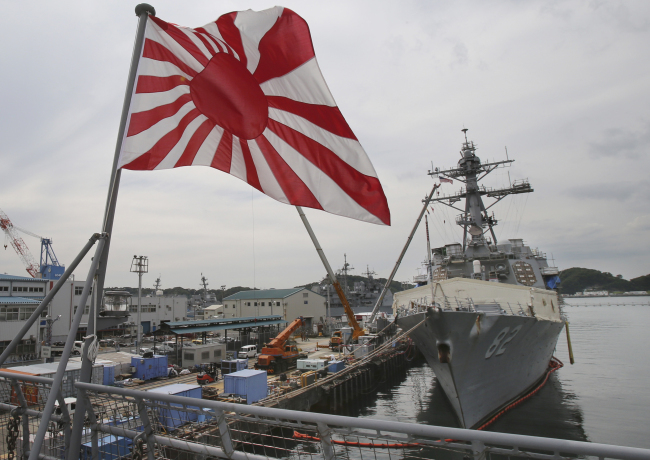Japan has reportedly decided not to attend an international naval event to be held in South Korea next week, amid a dispute over its plan to raise the Rising Sun Flag widely seen as a symbol of Japan’s military aggression here.

A Japanse warship is seen with a Rising Sun flag in the foreground in a Japanese port in 2014. Yonhap
Japan notified South Korea of the decision on Friday morning. It will instead send a delegation to a symposium to be held as part of the Jeju International Naval Fleet Review from Oct. 10-14, according to a local media outlet, which quoted an unnamed government source.
The decision came amid controversy in South Korea over Japan’s plan to hoist the Rising Sun Flag, which South Koreans often compare to Nazi symbols such as the swastika, at the upcoming naval event.
The presidential office received some 250 petitions calling on the government to ban Japanese warships flying the flag from entering South Korean territory. A ruling party lawmaker even proposed a related bill.
Apparently mindful of public outcry over the Rising Sun Flag, the Navy earlier requested all 15 countries participating in this year’s naval fleet review to raise their own national flags as well as the national flag of South Korea, not their military flags.
However, Japan had said it would hoist the flag, calling the request “unacceptable.” Japan’s Defense Minister Itsunori Onoder said it is obligatory for the Maritime Self-Defense Force Ships to raise the military flag under the domestic law, and it is also an exterior mark to express the warship’s nationality under the international treaty.
Katsutoshi Kawano, chief of staff of Japan’s Self Defense Forces, called the hoisting of the flag a matter of national pride.
The Japanese naval force adopted the flag as its official ensign when the organization was launched in 1954.
The red-and-white Rising Sun Flag, which was used by the Imperial Japanese Army during the end of World War II, is considered by Koreans as a representation of Japan’s imperialistic militarism and its repressive occupation of the Korean Peninsula from 1910 to 1945. The sentiment is shared by other Asian countries once colonized by Japan, such as China.
The Navy and the Foreign Ministry had asked Japan not to fly the flag, citing negative public sentiment here.
Relations between Korea and Japan have often been strained by historical issues related to atrocities committed by Japan during its colonial rule of Korea, including Japan’s sexual enslavement of South Korean women at front-line brothels. However, the two countries enjoy close cultural ties and seek to enhance cooperation on the security front.
(laeticia.ock@heraldcorp.com)






